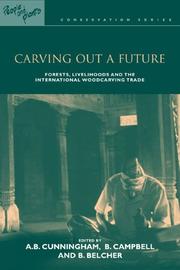| Listing 1 - 3 of 3 |
Sort by
|


ISBN: 184407045X 1136570160 9786610476152 1849770700 6000000227 128047615X 1423728378 9781849770705 9781423728375 9781844070459 Year: 2005 Publisher: London Sterling, VA Earthscan
Abstract | Keywords | Export | Availability | Bookmark
 Loading...
Loading...Choose an application
- Reference Manager
- EndNote
- RefWorks (Direct export to RefWorks)
Very little has yet been written about the cultural or economic contributions of woodcarving to people's livelihoods or the consequences of felling hardwood and softwood trees for the international woodcarving trade. Carving Out a Future is the first examination of this trade and its critical links to rural livelihoods, biodiversity, conservation, forestry and the international trade regime. A range of case studies from Australia, Bali, India,Africa and Mexico provides a lens for examining the critical issues relating to the significant impacts of woodcarving on forests, conservation efforts,
Wood-carving industry --- Environmental aspects --- Woodworking industries
Book
ISBN: 9781477318805 9781477318812 9781477318829 9781477318836 1477318828 1477318836 1477318801 147731881X Year: 2019 Publisher: Austin, Tex. University of Texas Press
Abstract | Keywords | Export | Availability | Bookmark
 Loading...
Loading...Choose an application
- Reference Manager
- EndNote
- RefWorks (Direct export to RefWorks)
"Unlike many other handicrafts in the Mexican state of Oaxaca, which have long cultural and historical trajectories, Oaxacan woodcarving began in the second half of the twentieth century and has always been done for the commercial market. In The Value of Aesthetics, Alanna Cant explores how one family's workshop in the village of San Martín Tilcajete has become the most critically and economically successful, surpassing those of neighbors who use similar materials and techniques. The dominance of this family is tied to their ability to produce a new aesthetic that appeals to three key 'economies of culture': the tourist market for souvenirs, the national market for traditional Mexican artesanías, and the international market for indigenous art. Offering a new analytical model by which anthropologists can approach visual aesthetics and conceptualize the power of artworks as socially active objects, The Value of Aesthetics shows how aesthetic practices produce and redefine social and political relationships. By investigating the links between aesthetics and issues of production, authorship, ownership, and identity, Cant shows aesthetic change to be a process that ultimately repackages everyday life into commodified objects in Oaxaca."--
Applied arts. Arts and crafts --- Oaxaca --- Indian wood-carving --- Wood-carving industry --- Aesthetics --- Culture --- Indians of Mexico --- Economic aspects --- Material culture --- Mexico
Book
ISBN: 1477318828 147731881X 1477318801 9781477318829 Year: 2019 Publisher: Austin, Texas : University of Texas Press,
Abstract | Keywords | Export | Availability | Bookmark
 Loading...
Loading...Choose an application
- Reference Manager
- EndNote
- RefWorks (Direct export to RefWorks)
Unlike many other handicrafts in the Mexican state of Oaxaca, which have long cultural and historical trajectories, Oaxacan woodcarving began in the second half of the twentieth century and has always been done for the commercial market. In The Value of Aesthetics, Alanna Cant explores how one family’s workshop in the village of San Martín Tilcajete has become the most critically and economically successful, surpassing those of neighbors who use similar materials and techniques. The dominance of this family is tied to their ability to produce a new aesthetic that appeals to three key “economies of culture”: the tourist market for souvenirs, the national market for traditional Mexican artesanías, and the international market for indigenous art. Offering a new analytical model by which anthropologists can approach visual aesthetics and conceptualize the power of artworks as socially active objects, The Value of Aesthetics shows how aesthetic practices produce and redefine social and political relationships. By investigating the links between aesthetics and issues of production, authorship, ownership, and identity, Cant shows aesthetic change to be a process that ultimately repackages everyday life into commodified objects in Oaxaca.
Indian wood-carving --- Wood-carving industry --- Aesthetics --- Culture --- Indians of Mexico --- Economic aspects --- Material culture --- Indians of North America --- Indigenous peoples --- Meso-America --- Meso-American Indians --- Mesoamerica --- Mesoamerican Indians --- Pre-Columbian Indians --- Precolumbian Indians --- Ethnology --- Cultural sociology --- Sociology of culture --- Civilization --- Popular culture --- Beautiful, The --- Beauty --- Esthetics --- Taste (Aesthetics) --- Philosophy --- Art --- Criticism --- Literature --- Proportion --- Symmetry --- Woodworking industries --- Indians --- Wood-carving, Indian --- Wood-carving --- Social aspects --- Psychology --- Radio broadcasting Aesthetics
| Listing 1 - 3 of 3 |
Sort by
|

 Search
Search Feedback
Feedback About UniCat
About UniCat  Help
Help News
News